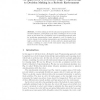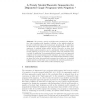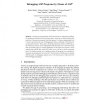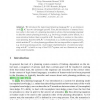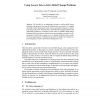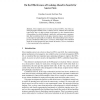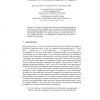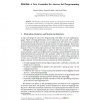115
click to vote
LPNMR
2007
Springer
15 years 7 months ago
2007
Springer
Recent research in answer-set programming (ASP) is concerned with the problem of finding faithful transformations of logic programs under the stable semantics. This is in particul...
138
Voted
LPNMR
2007
Springer
15 years 7 months ago
2007
Springer
Decision making models for autonomous agents have received increased attention, particularly in the field of intelligent robots. In this paper we will show how a Defeasible Logic ...
107
Voted
LPNMR
2007
Springer
15 years 7 months ago
2007
Springer
Abstract. We present a framework for updating logic programs under the answer-set semantics that builds on existing work on preferences in logic programming. The approach is simple...
104
Voted
LPNMR
2007
Springer
15 years 7 months ago
2007
Springer
Abstract. We present a purely model-theoretic semantics for disjunctive logic programs with negation, building on the infinite-valued approach recently introduced for normal logic...
88
Voted
LPNMR
2007
Springer
15 years 7 months ago
2007
Springer
Answer-set programming (ASP) has become an important paradigm for declarative problem solving in recent years. However, to further improve the usability of answer-set programs, the...
74
Voted
LPNMR
2007
Springer
15 years 7 months ago
2007
Springer
We introduce the logic-based planning language Kc as an extension of K [5]. Kc
116
Voted
LPNMR
2007
Springer
15 years 7 months ago
2007
Springer
We describe BE, an implemented system for solving belief change problems in the presence of actions. We illustrate how we can use BE to compute the result of belief progression, be...
96
Voted
LPNMR
2007
Springer
15 years 7 months ago
2007
Springer
Abstract. Most complete answer set solvers are based on DPLL. One of the constraint propagation methods is the so-called lookahead, which has been somewhat controversial, due to it...
99
Voted
LPNMR
2007
Springer
15 years 7 months ago
2007
Springer
In this paper by considering an answer set programming approach and some basic ideas from possibilistic logic, we introduce a possibilistic disjunctive logic programming approach t...
97
Voted
LPNMR
2007
Springer
15 years 7 months ago
2007
Springer
We describe a new grounder system for logic programs under answer set semantics, called GrinGo. Our approach combines and extends techniques from the two primary grounding approach...

